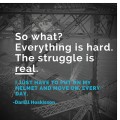“Oh!” I hear my children yell. “Augh!!” They holler. I hear laughing with loud exclamations as I hurry to the family room to see what is going on. They are watching “fails” on the internet and enjoying the death defying mistakes of others, some that make me hurt all over. Somehow this has become entertainment?
Falls, bends that would break your back, dumb attempts at dumb behavior, some innocent crashes caught on tape all add up to a big, fame creating “fail.”
I hate failure
 I study success, so it is amazing to me why anyone would want to study the opposite. Why study failure? While watching a person jump off their roof into the pool borders on insane, understanding failures is an intricate process that can ultimately lead to our success.
I study success, so it is amazing to me why anyone would want to study the opposite. Why study failure? While watching a person jump off their roof into the pool borders on insane, understanding failures is an intricate process that can ultimately lead to our success.
Ever agonize over a bad grade? What about a lost game? Losing a contest? Not getting the goal? Wishing, stewing, and brooding over past failures can lead to discouragement, quitting, and more failure. Many in sports know that when you lose a game, you move on. In a lot of ways it helps to let it go and start fresh on the next endeavor. We hate even thinking about losing. Attraction theory suggests that just thinking about losing can bring it to you, and we tend to notice and exaggerate what we focus on. How could there be any advantage to studying failure?
I love failure
I have been studying behavior change and helping people reach their goals for the last several months and I’m so excited to share with you the things I’ve learned. One thing I learned is that I like failure. I might have to remind myself why.
Beginners make mistakes. No kidding. It is hard to be a beginner. So, if you are starting a new class, a new subject, a new skill, you have to expect to fail, or at least fall over and over again. We all know Edison failed more than most people we know, and he ended up a huge success almost because of it. He was willing to try things that might not work. He was willing to fail and try again.
Albert Einstein said, “It’s not that I’m so smart, it’s just that I stay with problems longer.” He was willing to not know, not understand, and keep trying to solve those problems. So, success usually requires mistakes and endurance. If we are too afraid to fail, we might not start or overcome the obstacles that are both essential to success.
There is a thrill to trying new things, things you might fail at. I read a personality survey that listed this type of courageous person as “thrill-seeking”. I hated the negative portrayal, as if this type of trait were necessarily bad. Might not it also be bad to never try something new? Never begin something in case you couldn’t finish? Because what if you succeed beautifully? What if you do finish? I don’t think a courageous person who tries new things is necessarily an immature teenager.
 I watched a TED Talk that explained the learning curve. It graphically showed that we learn the most at the beginning. Advanced participants and learners are learning less content and skill, but that extra, specialized and detailed practice or learning is like the icing on the top. It is the difference between average and success. The cherry is the difference between professional quality and world class. But the greatest amount of learning is at the beginning. It is the cake. So, if we are doing something hard that we mess up a lot, we can be assured, we are also in a position of great learning. I love to learn, therefore, I love failure.
I watched a TED Talk that explained the learning curve. It graphically showed that we learn the most at the beginning. Advanced participants and learners are learning less content and skill, but that extra, specialized and detailed practice or learning is like the icing on the top. It is the difference between average and success. The cherry is the difference between professional quality and world class. But the greatest amount of learning is at the beginning. It is the cake. So, if we are doing something hard that we mess up a lot, we can be assured, we are also in a position of great learning. I love to learn, therefore, I love failure.
When to Compliment and When to Correct
My husband and I have been in an ongoing debate our whole marriage about what is most helpful to our children: encouragement and noticing the positive, or criticism and noticing what is lacking. I think you can guess that I, the cheerleader, prefer noticing what is done right, compliments, and patience. My husband, who is the programmer, sees the value in pointing out the “bugs” and correcting them. Which is best?
I was very excited to find out in my behavior specialist class that there is a best use for each. Beginners make a lot of mistakes and will likely find themselves frustrated and less successful if they focus on their mistakes. Beginners do best when they focus on and celebrate what they do right. (Go Team!)
 Intermediate learners are most at risk to tire of the persistent effort it takes to succeed. So, they need encouragement to not quit the daily or incremental process that will lead to success. The goal in the middle is consistent, persistent effort. (Go Team!)
Intermediate learners are most at risk to tire of the persistent effort it takes to succeed. So, they need encouragement to not quit the daily or incremental process that will lead to success. The goal in the middle is consistent, persistent effort. (Go Team!)
When someone is proficient, then is the time that they need criticism. An advanced learner will not learn more from someone who is giving them a pat on the back. They need helpful, specific, and detailed information about what they did wrong and how to correct it. (Fix that bug.) A criticized, advanced learner might even thank you for caring enough to teach them the finer points or nuances they can’t yet see. Confident learners are not likely to quit and are not likely to get discouraged by occasional failures in a sea of success. They need kindly intended, expert criticism.
Are you too hard on yourself?
Chances are that you started this year off with good intentions. I spent a good part of the last month studying how to set the best goals and how to succeed at personal change. I know that most people who start something new will quit before six or seven months is done. So, it seems, there is a cliff looming somewhere in mid June.
It might surprise you to know that perfectionism is the acid killer of good intentions with realistic actions. We tend to imagine more and better than is realistic for our stage of learning and the other responsibilities and obligations we already have. I’ll tell you right now that we are not going to get all our goals perfectly and most certainly not on the first try.
So, give yourself a little credit for being human. It is okay to fail. Not only can we be okay with it, we can hug it like a white blood cell encircles a germ and makes an antibody with it. If you are a beginner, discouragement is the enemy. Hug yourself and notice what you have done well. If you are somewhere in the middle, inconsistency and skipping, quitting, or cheating on daily efforts is the enemy.

Everyday Disciple- To read more of DarEll’s articles, click here.
Expect obstacles and mistakes to continue. The ongoing challenges and failures hold key clues about how to predict, compensate for, and avoid or overcome them. And, when you finally become an expert, help another expert get even better. They will most likely appreciate it.
Failure is an opportunity for and maybe even a characteristic of learning.
Who is to say that quitting a goal is wrong?
One of the most freeing things I’ve learned in my life is how to let something go.
Only you will really know.
Namaste,
DarEll S. Hoskisson
About DarEll Hoskisson
DarEll S. Hoskisson loves to do hard things, but not too hard. She shares her own challenges, goals and experiences as she guides you into a realistic path of self-reflection and self-improvement. She shares tips on how to find, know and trust yourself so you can decide if other’s suggestions are right for you.
DarEll has the world a little upside down—where work is play and play is work. She actually thinks other people’s problems are fun to try to solve and lights up with a personal challenge. She loves people, harmony, and excellence. She also loves useful things like tools and ideas that make work faster, easier and more fun.
DarEll married in 1993 and graduated from BYU (1995) with a bachelor’s degree in English and Secondary Education. Since then she was adopted by 5 children and has worked with many non-profits. She is currently a certified personal trainer and group fitness instructor—leading pilates and yoga at her local YMCA.
DarEll lives in Florida where she enjoys her family, nature, her work, and encouraging people to live well.
She periodically posts her poems, what she is learning, and service opportunities on her personal blogs:
https://personalabridgements.wordpress.com and https://darellhoskisson.wordpress.com
Twitter •







Thank you for this!